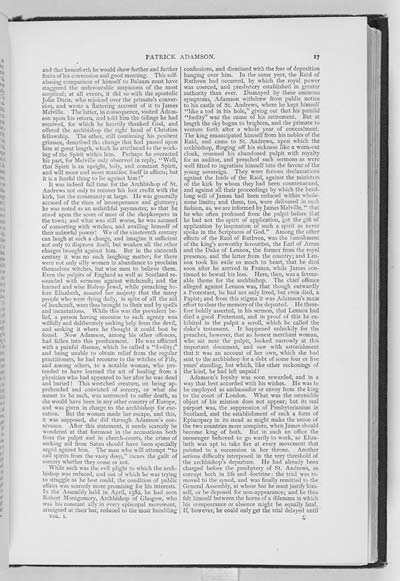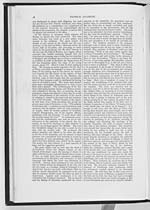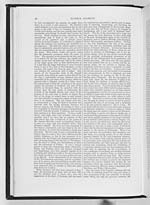17
and that henceforth he would show further and further
fruits of his conversion and good meaning. This self-
abasing comparison of himself to Balaam must have
staggered the unfavourable suspicions of the most
sceptical; at all events, it did so with the apostolic
John Durie, who rejoiced over the primate's conver-
sion, and wrote a flattering account of it to James
Melville. The latter, in consequence, visited Adam-
son upon his return, and told him the tidings he had
received, for which he heartily thanked God, and
offered the archbishop the right hand of Christian
fellowship. The other, still continuing his penitent
grimace, described the change that had passed upon
him at great length, which he attributed to the work-
ing of the Spirit within him. Perhaps he overacted
his part, for Melville only observed in reply, "Well,
that Spirit is an upright, holy, and constant Spirit,
and will more and more manifest itself in effects; but
it is a fearful thing to lie against him!"
It was indeed full time for the Archbishop of St.
Andrews not only to recover his lost credit with the
kirk, but the community at large. He was generally
accused of the vices of intemperance and gluttony;
he was noted as an unfaithful paymaster, so that he
stood upon the score of most of the shopkeepers in
the town; and what was still worse, he was accused
of consorting with witches, and availing himself of
their unlawful power! We of the nineteenth century
can laugh at such a charge, and imagine it sufficient
not only to disprove itself, but weaken all the other
charges brought against him. But in the sixteenth
century it was no such laughing matter; for there
were not only silly women in abundance to proclaim
themselves witches, but wise men to believe them.
Even the pulpits of England as well as Scotland re-
sounded with sermons against witchcraft; and the
learned and wise Bishop Jewel, while preaching be-
fore Elizabeth, assured her majesty that the many
people who were dying daily, in spite of all the aid
of leechcraft, were thus brought to their end by spells
and incantations. While this was the prevalent be-
lief, a person having recourse to such agency was
wilfully and deliberately seeking help from the devil,
and seeking it where he thought it could best be
found. Now Adamson, among his other offences,
had fallen into this predicament. He was afflicted
with a painful disease, which he called a "foedity;"
and being unable to obtain relief from the regular
practitioners, he had recourse to the witches of Fife,
and among others, to a notable woman, who pre-
tended to have learned the art of healing from a
physician who had appeared to her after he was dead
and buried ! This wretched creature, on being ap-
prehended and convicted of sorcery, or what she
meant to be such, was sentenced to suffer death, as
she would have been in any other country of Europe,
and was given in charge to the archbishop for exe-
cution. But the woman made her escape, and this,
it was supposed, she did through Adamson's con-
nivance. After this statement, it needs scarcely be
wondered at that foremost in the accusations both
from the pulpit and in church-courts, the crime of
seeking aid from Satan should have been specially
urged against him. The man who will attempt "to
call spirits from the vasty deep," incurs the guilt of
sorcery whether they come or not.
While such was the evil plight to which the arch-
bishop was reduced, and out of which he was trying
to struggle as he best could, the condition of public
affairs was scarcely more promising for his interests.
In the Assembly held in April, 1582, he had seen
Robert Montgomery, Archbishop of Glasgow, who
was his constant ally in every episcopal movement,
arraigned at their bar. reduced to the most humbling
confessions, and dismissed with the fear of deposition
hanging over him. In the same year, the Raid of
Ruthven had occurred, by which the royal power
was coerced, and presbytery established in greater
authority than ever. Dismayed by these ominous
symptoms, Adamson withdrew from public notice
to his castle of St. Andrews, where he kept himself
"like a tod in his hole," giving out that his painful
"foedity" was the cause of his retirement. But at
length the sky began to brighten, and the primate to
venture forth after a whole year of concealment.
The king emancipated himself from his nobles of the
Raid, and came to St. Andrews, upon which the
archbishop, flinging off his sickness like a worn-out
cloak, resumed his abandoned pulpit with royalty
for an auditor, and preached such sermons as were
well fitted to ingratiate himself into the favour of the
young sovereign. They were furious declamations
against the lords of the Raid, against the ministers
of the kirk by whom they had been countenanced,
and against all their proceedings by which the head-
long will of James had been reduced within whole-
some limits; and these, too, were delivered in such
fashion, as, we are informed by James Melville, " that
he who often professed from the pulpit before that
he had not the spirit of application, got the gift of
application by inspiration of such a spirit as never
spoke in the Scriptures of God." Among the other
effects of the Raid of Ruthven, was the banishment
of the king's unworthy favourites, the Earl of Arran
and the Duke of Lennox, the former from the royal
presence, and the latter from the country; and Len-
nox took his exile so much to heart, that he died
soon after he arrived in France, while James con-
tinued to bewail his loss. Here, then, was a favour-
able theme for the archbishop. The chief offence
alleged against Lennox was, that though outwardly
a Protestant, he had not only lived, but even died, a
Papist; and from this stigma it was Adamson's main
effort to clear the memory of the departed. He there-
fore boldly asserted, in his sermon, that Lennox had
died a good Protestant, and in proof of this he ex-
hibited in the pulpit a scroll, which he called the
duke's testament. It happened unluckily for the
preacher, however, that an honest merchant woman,
who sat near the pulpit, looked narrowly at this
important document, and saw with astonishment
that it was an account of her own, which she had
sent to the archbishop for a debt of some four or five
years' standing, but which, like other reckonings of
the kind, he had left unpaid!
Adamson's loyalty was soon rewarded, and in a
way that best accorded with his wishes. He was to
be employed as ambassador or envoy from the king
to the court .of London. What was the ostensible
object of his mission does not appear; but its real
purport was, the suppression of Presbyterianism in
Scotland, and the establishment of such a form of
Episcopacy in its stead as might make the union of
the two countries more complete, when James should
become king of both. But in such an office the
messenger behoved to go warily to work, as Eliza-
beth was apt to take fire at every movement that
pointed to a succession in her throne. Another
serious difficulty interposed in the very threshold of
the archbishop's departure. He had already been
charged before the presbytery of St. Andrews, as
corrupt both in life and doctrine: the trial was re-
moved to the synod, and was finally remitted to the
General Assembly, at whose bar he must justify him-
self, or be deposed for non-appearance; and he thus
felt himself between the horns of a dilemma in which
his compearance or absence might be equally fatal.
If. however, he could only get the trial delayed until�

![]() Universal Viewer |
Universal Viewer | ![]() Mirador |
Large image | Transcription
Mirador |
Large image | Transcription
![]()

